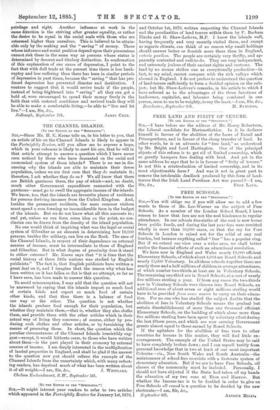THE CHANNEL ISLANDS.
[To THE EDITOR OF THE " SPECTATOR."]
So.,—Since Mr. H. E. Keene tells us, in his letter to you, that an article of his on the Channel Islands is likely to appear in the Fortnightly Review, will you allow me to express a hope, which in your columns is likely to meet his eye, that he will in that article attempt to answer a question which I have never seen noticed by those who have descanted on the social and economical system of those islands P There is no use in dis- cussing why the islands are able to maintain their dense population, unless we are first sure that they do maintain it; therefore, I ask whether they do so P We all know that there are British garrisons there, the pay of which—and, no doubt, much other Government expenditure connected with the garrisons—must go to swell the aggregate income of the islands. We know, too, that the islands are favourite places of residence for persons deriving incomes from the United Kingdom. And, besides the permanent residents, the mere summer visitors must spend a sum forming no inconsiderable item in the budget of the islands. But we do not know what all this amounts to ; and yet, unless we can form some idea on the point, no con- clusion can be drawn from the density of the island population.
No one would think of inquiring what was the legal or social system of Gibraltar as an element in determining how 18,000 persons, besides the military, can live on the Rock. The case of the Channel Islands, in respect of their dependence on external sources of income, must be intermediate to those of England and Gibraltar. But in what degree of proximity does it stand to either extreme ? Mr. Keene says that "it is time that the social history of these little nations was studied by English publicists." The fact is, that English publicists have written a great deal on it, and I imagine that the reason why what has been written on it has fallen so flat is that no attempt, so far as I have seen, has been made to answer this question.
To avoid misconception, I may add that the question will not be answered by saying that the islands import so much food of certain kinds and export so much food of certain other kinds, and that thus there is a balance of food one way or the other. The question is not whether the islands produce food enough for their population, but whether they maintain them,—that is, whether they also clothe them, and provide them with the other articles which in their actual way of living they consume ; of course, either by pro- ducing such clothes and other articles, or by furnishing the means of procuring them. In short, the question which the peculiar circumstances of the Channel Islands irresistibly sug- gest—except, it would hitherto seem, to those who have written about them—is the part played in their economy by external sources of income. I am deeply interested in the multiplication of landed properties in England, and shall be glad if the answer to the question now put should relieve the example of the Channel Islands from the uncertainty which, with many reflect- ing readers, has deprived much of what has been written about
it of all weight.—I am, Sir, &c., J. WESTLAKE. Chelsea Embankment, S.W., September 5th.


































 Previous page
Previous page